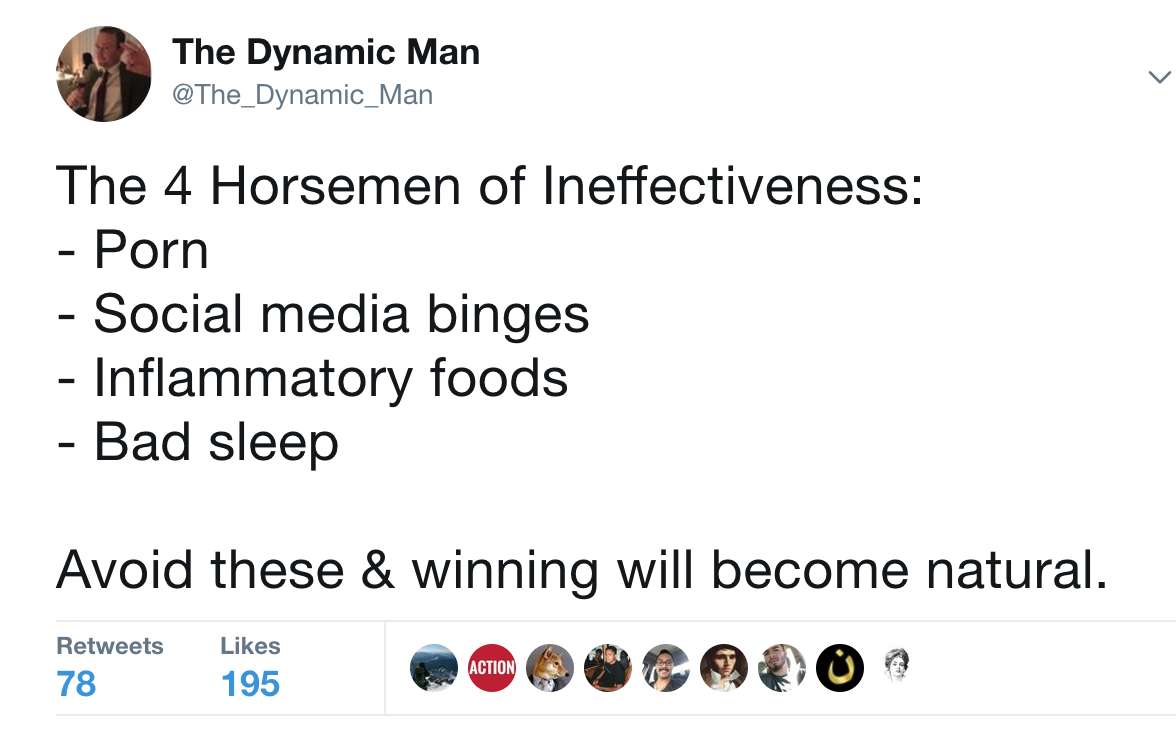
Spend enough time in the self-improvement community, and you’ll hear pretty much every opinion out there on how to accomplish your goals.
“Spend 20 minutes visualizing your ideal day before you go to bed”
“Spent 15 minutes after you wake up doing mind exercises”
“Write down 10 ideas every morning before you start working”
“Create a to-do list of things you want to accomplish both today and this week and carry it around with you”
All of these approaches have credibility to them, and I am not dissing them, as they clearly they have worked for some people.
But lets be honest here.
Have any of them actually solved your motivation problem?
My guess is there might be an improvement here and there on the margins, but most of the time, not so much. Sure you might play around with them for a week or so (and even talk up how amazing they are on Twitter) — but big picture, not much changes.
In fact, sometimes after an initial burst of productivity, you might get even less done.
This phenomenon boggles and frustrates people, but trust me — you’re not alone, and it’s really not as bizarre as it seems.
You see, “production struggles” come from mainly two things:
- An overload of tasks that disrupts focus and overwhelms
- Being stuck in a consumption, not production, mindset
Let’s take a step back and think about this. If your problem is you have too much to do… or you spend your time consuming too much information… what does searching for and adding in productivity hacks do?
Helps you avoid producing.
Indeed, it is the ultimate form of procrastination: putting off important work by taking on other work that claims to help you do your important work. Brilliant, really, from a rationalization standpoint.
(And if you’re reading this article, you might be guilty!)
But don’t get me wrong, I’m not anti-experimentation. If something is working for a lot of people, maybe it is worth trying it out. I am just skeptical most hacks (aside from basic, health-related ones) end up helping more than hurting — unless you developed them by yourself organically and unconsciously.
Mostly because I am skeptical of the intentions of the guys seeking these productivity hacks out. Too often their goal is feeling productive over being productive — or at least, being productive in the things that matter.

The reality is your energy is precious; you must not waste it.
In fact, your energy is so important, if you’re struggling with productivity, I’ve come to realize the best thing isn’t finding a new hack to get more done.
It’s to do nothing at all.
The Secret Rule of Productivity: When In Doubt, Do Nothing
Over the past few months, I’ve kept careful track of the decisions that improved my days and the ones that threw them off track.

The interesting thing about these impulses, however, was how linked they were. Consistently, if I indulged in one, the urge to engage in another would intensify.
It was like a battle line: if it broke in one place, it would break in the others.
Given this broad-based assault on my productivity, simple exhortations of “ok, now it’s time to do work” just didn’t matter. Willpower is finite, and in days where I had less in reserve, things fell apart, and shame would strike.
To avoid falling into the pattern I faced two options. The first I’ve written about before: get outside of my environment. This was effective at creating a pattern interrupt.
But it’s not always easy or practical to get out of your environment; you can’t just jump from place to place to avoid doing the wrong thing.
So I learned to do something unconventional.
Nothing.
Embrace Boredom. The more you allow yourself to feel it,
the more you’ll be productive.
Take a look at the people on a modern subway and you’ll learn something intimate about humans: we hate being bored.
Random people used to chat on trains because unless they had a book on hand, talking to a stranger was the only way to pass the time; to derive some “content” from the situation by both producing and consuming conversation. Similarly, people had “hobbies” because they were “productive” activities that engaged their mind in their spare time.
Both production and consumption rescue the mind from boredom, and both require energy to do so.
The difference between production and consumption is the results. Production is active: it builds skills, and even if said skills are not particularly useful, the simple act of having ability creates confidence. The more things you master, the more things you trust yourself to be able to master — regardless of what the future holds.
Consumption on the other hand is passive. It builds little to no skills, and when done to excess develops the opposite mindset. If you are used to consuming the fruits of others’ labor, the subtext is that you are unable to produce your own sustenance. Weakness, cowardliness, and dependence are the results.
But the mind is a lazy thing. Like it would prefer to find fruit and vegetables abundantly in the wild than spending a year laboring to grow them, it prefers to consume rather than produce. Production might increase your energy capacity and efficiency over time, but consumption requires less energy up front. Unconsciously, the average person will choose the latter every time.
Obviously, if you hope to improve as an individual and reach your goals this is bad.
But let’s be real here: trying to force yourself to choose production over consumption can be hard. Part of you screams “I don’t want to do this, this is too tedious, I want to distract myself.”
The answer is to stop forcing yourself to do anything and just sit there with the tension.
Instead of telling yourself “you have to do this” and subjecting yourself to a mental civil war, all you say is: “Ok, you don’t have to do your work, but you CAN’T distract yourself and do something else.”
100% of the time, after a minute or two of sitting at your desk doing nothing, the impulse to consume will fade and you will return to productive work.
And little by little, it’ll change the circuits giving you trouble to begin with.

Why You Must Kill Bad Reward Circuits
Earlier we mentioned that if I pursued one of my “four horsemen of un-productivity,” another one wasn’t far behind.
The reason for this is because each of these “horsemen” existed on the same “stress-removal / satiation” reward circuit. If I blocked or burned out one trigger, another would jump on the line to take its place and re-activate the circuit.
This is common with habits: you can replace the switch on the circuit, but not the circuit itself. It’s the same reason most recovering alcoholics become smokers: they can’t get rid of the itch, so they replace their way to scratch it.
A reasonable stop-gap measure when your “switch” is particularly life-destructive. But long-term, it’s not a good solution. Generally a circuit used to a strong stimulus or “switch” needs it to be replaced with another strong stimulus… and strong stimuli are rarely beneficial (why most alcoholics don’t get by replacing their whisky with tea).
No, you will never free yourself of your disruptive circuit so long as you continue to divert energy down that circuit. And since circuits grow the more energy you send down them, the only way to make them dormant is to fully deprive them.
Which is why, when a bad impulse strikes, instead of forcing yourself past it, just do nothing.
Cut off the energy flow if you’re struggling to direct where it’s going.
And just sit there, bored, until you get so bored you go back to what you set out to do: the big, important tasks.
Will you fall off the wagon?
Sure. That’s inevitable (it’s also how you learn).
But it’s by far the easiest approach to avoiding and weakening not bad impulses that I’ve found.
Talk soon,
Pat
[et_bloom_inline optin_id=optin_1]

